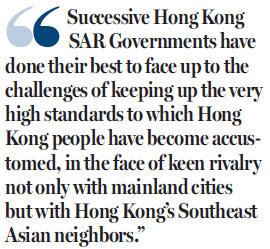Hong Kong is still a wonderful place to live
Updated: 2016-09-26 07:58
By Tim Collard(HK Edition)
|
|||||||||
Tim Collard says the SAR, as a small region with no natural resources, has always excelled in the quality of its human capital
I first came to Hong Kong in 1988. I was studying Mandarin at the Chinese University of Hong Kong. OK - Hong Kong at that time perhaps wasn't the greatest place to study Mandarin, as in those days virtually no one spoke it. But it was a great place to live. Not because I was a representative of the colonial power - I was a very junior member of Her Majesty's Diplomatic Service, studying to be a proper British sinologist.
At that time Hong Kong was very much the commercial gateway to a rapidly developing China. British and other Western companies generally employed agents and "fixers" from the territory in order to make and maintain contacts on the mainland. These, on the whole, were extraordinarily dedicated and resourceful business people, who ensured that British business' impression of China was of a lively and welcoming environment where anything was possible - possible, but not easy: The Hong Kong "fixers" were in no hurry to make themselves redundant!
All this has of course changed: There are now many entry points throughout China which are well set up to welcome and process foreign business and investment. But Hong Kong remains special, simply because of the length of time that it has functioned as China's gateway. As a financial center and interface between the way money is managed in the Western world and the new ways being developed on the mainland - which is keen to play its own part in writing the global rules of engagement - Hong Kong remains unparalleled. But it is not solely or even mainly as a fine working model of "global business with Chinese characteristics" that Hong Kong's significance lies.
A small territory with no natural resources is bound to depend upon the quality of its human capital and there are many examples of this among the world's small states and territories. Here, Hong Kong has always excelled. Educational standards have traditionally been maintained at a high level (though this can no longer be taken for granted in a fiercely competitive environment), and the combination of Chinese thoroughness and application with Western imagination have consistently produced people who are not only knowledgeable but resourceful, adaptable and innovative. Not only do they keep Hong Kong buzzing, but people of Hong Kong heritage are making a disproportionate contribution to the economies of many Western countries without in any way losing their ties to the motherland.
Successive Hong Kong SAR Governments have done their best to face up to the challenges of keeping up the very high standards to which Hong Kong people have become accustomed, in the face of keen rivalry not only with mainland cities but with Hong Kong's Southeast Asian neighbors. This year's government programs, as set out by the Chief Executive and the financial secretary, have emphasized the need for policies which can ensure support for ultra-modern industry, technology and innovation, along with the education, housing and healthcare to attract and retain top-level people in these fields.

But it would be a mistake to think of Hong Kong as just an economic entity. When I first came to this city I assumed that it would be a concrete jungle, in which every patch of land at less than 45 degrees to the horizontal had a skyscraper built on it. In fact it is beautiful in many ways, from the green areas where one can walk all day to the splendid beaches. Hong Kong is not just functional - the quality of life is splendid. There are, of course, two major problems which are not easy to address. One is air pollution, which largely originates elsewhere and thus there is not so much the Hong Kong authorities can do about it. The other is the quite astonishing cost of living; but that is a facet of all economically successful cities, as anyone who has lived in London knows well. But Hong Kong people cope and thrive - these are resourceful people who don't expect anything in life to be handed to them on a plate, and adapt and keep on working their socks off.
So I have been coming to Hong Kong for nearly 30 years now, a period which spanned the transfer of sovereignty in 1997. When I next visited in 1998 I was (mildly) surprised to see how little had changed. The arrangements for the peaceful handover were unique in world history: Of course there was tough negotiating, as very important interests were involved, but I found that period exhilarating - especially as it changed nothing in the essentially vibrant and positive nature of Hong Kong. Every time I land at the Chek Lap Kok airport and board the train for Central, I still get the same thrill as I did negotiating the mountains on the approach to Kai Tak in the old days. I look forward to repeating this thrill for the rest of my life.
The author is a sinologist and former British diplomat in Beijing for nine years. He now works as a freelance commentator and writer.
(HK Edition 09/26/2016 page9)